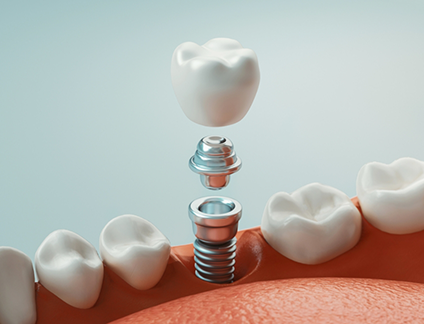Dental Implants Peabody
A Fresh Start for Your New Smile

With dental implants, it doesn’t just feel like you’ve replaced your teeth, but rather you’ve gotten your real teeth back. The level of technology, technique, and materials used for implants is well above other tooth replacement methods, and no one understands that better than the team at Peabody Smile Design. Our own Dr. Kashyap is an expert when it comes to dental implants in Peabody, and whether you’re hoping to bring back one tooth or all of them, you can trust he’ll guide you toward the complete smile you deserve.
Why Choose Peabody Smile Design for Dental Implants?
- All-Inclusive Dental Implant Treatment
- Led by a Dentist with Special Training in Implants
- Personalized Treatment Plans for Every Dental Patient
What Are Dental Implants?

A dental implant is actually a small titanium post that is placed into the jawbone, essentially becoming a new tooth root. There, it undergoes a natural process called osseointegration, bonding with the bone just like a real tooth would. From there, it can be relied on to support a crown, bridge, or denture that can be expected to last for decades.
The 4 Step Dental Implant Process

Dental implants are a complex restoration that involve four main steps. Fortunately, your team in Peabody can complete the entire process in-house, saving you time spent on driving to multiple offices for your treatment. Continuing scrolling to learn more about what your dental implant journey will look like, or contact our office to hear it from us directly! We’ll happily address any questions and concerns you might have as you consider your restoration options.
Initial Dental Implant Consultation

Are dental implants right for you? We can talk about your options at a consultation as well as walk you through what the process will be like for your unique situation. This will include a thorough oral examination, and planning any preliminary treatments you might need to promote a successful dental implant placement (such as gum disease therapy or a bone graft).
Dental Implant Surgery

If you decide to proceed, you’ll have your dental implants placed in our office, meaning you won’t have to visit an outside specialist like with most other practices. We’ll make small incisions in your gumline in order to access your jawbone, then suture them shut once your implant posts are properly situated. Rest assured, the jawbone has very few nerve endings, and we’ll administer a local anesthetic to secure your comfort.
Dental Implant Osseointegration & Abutment Placement

As your mouth heals over the course of three to six months, osseointegration will take place. This is when your jawbone grows to fuse with the biocompatible implant posts and is why dental implants are strong and secure. Eventually, you’ll return to the office so we can attach abutments to your implants (these will serve as connectors to your new teeth).
Delivery of Dental Implant Restorations

In order to fully customize the look and feel of your dental implants, we’ll take impressions of your mouth and send the information to a dental lab. The artful technicians there will carefully craft your implants to fit comfortably and appear as a seamless part of your smile. For your final appointment, we’ll connect your new teeth to your abutments, and your new smile will be ready for the world!
Dental Implant Failure & Salvage

If your dental implants seem to be loose or are causing you unusual discomfort, there’s a chance that they may have failed. But there’s no need to panic; our team is ready to help you find the source of the problem and take whatever steps are necessary to protect your smile. As soon as you have reason to believe that you are experiencing dental implant failure, call our office to start exploring your salvage options.
Learn More About Dental Implant Failure & Salvage
The Benefits of Dental Implants

Dental implants are the best tooth replacement option out there! Since they replace the roots of the missing teeth, they offer a wide range of benefits that you can’t get from dentures or dental bridges. Here are just some of the exciting benefits that you can look forward to when you replace your missing teeth with dental implants.
Day-to-Day Benefits

Dental implants look and feel just like real teeth do. You shouldn’t even detect much of a difference in your everyday life. Here are some of the benefits you can enjoy every single day.
- Bite Force: Dental implants are anchored in place by the jawbone, allowing you to enjoy a wide variety of foods with complete confidence.
- Easy Maintenance: All a patient has to do is brush and floss their teeth like normal to keep their implants looking and functioning like new.
- Confidence: Unlike other dental prosthetics, dental implants are self-supporting and don’t have unnatural-looking metal or acrylic attachments. This helps them restore the smile’s appearance as well as its function.
Health Benefits

In addition to daily benefits, your health will be positively affected by your dental implants. Here are some health benefits you can experience.
- Improved Oral Health: Dental implants help to prevent additional oral health issues from arising, like gum disease and additional tooth loss.
- Improved General Health: Having excellent oral health will positively influence your general health. Dental implants lower your risk of serious medical issues, including diabetes and cardiovascular disease.
- Prevents Bone Loss: The jawbone naturally starts to shrink after tooth loss, and right now, dental implants are the only tooth replacement shown to stop jawbone loss!
Long Term Benefits

When you opt for dental implants, you are making a long-term investment in the future of your smile. Here are some of the benefits that you can experience for many years to come.
- Long-Lasting: Thanks to the techniques and high-quality materials used to place implants, they have been shown to last anywhere from 30 years to life, which is many times longer than regular bridges and dentures.
- Successful: Dental implants have an amazing success rate of over 95%. Dental implant failure is highly unlikely.
- Save Money: You don’t need to worry about buying adhesives or soaking solutions when you have dental implants. They also don’t require frequent repairs and replacements. Dental implants also help to reduce your risk of additional oral health issues, saving you time, discomfort, and money!
Understanding the Cost of Dental Implants

Other than understanding the advantages of getting dental implants to rebuild your smile, it’s important to know how much your treatment will cost before committing to anything. The last thing you want is to be surprised by the price of replacing missing teeth with this method. Our team will discuss the estimate of your specific treatment during your initial consultation, and we’ll also go over the different factors that can influence the overall cost.
Preliminary Treatments & Dental Implant Surgery

Not everyone will be a candidate for dental implant treatment right off the bat. Sometimes patients may require preliminary services to get their oral health ready for the procedure. These may involve gum disease treatment, bone grafting, tooth extractions, or some other work that’s designed to prepare their smile for dental implants. Additionally, the surgery itself will also come with its unique cost, as no two smiles are ever the same, and we’ll develop a proper plan to address your specific situation. The good news is that our team can complete the entire process in-house, meaning you won’t have to worry about working with an outside specialist.
The Parts of Your Dental Implant

Some of the common parts of your dental implant that can impact the cost of treatment include:
- The number of implants: Replacing a single tooth will cost significantly less than replacing several or an entire dental arch.
- Type of restoration: A dental crown usually costs less than a bridge or denture, and smaller restorations are less expensive than bigger ones.
- Materials used: Most dental implants are made out of titanium, but some can be made of zirconia, which can cost more.
- Brand of implants: There are various dental implant manufacturers with their unique costs, and our team only works with those who offer the highest quality products.
How Dental Implants Can Save You Money

Although dental implants come with a typically higher price than traditional restorations, they provide far greater advantages in the long run. Not only do they mimic natural teeth, but they are much sturdier and can last several decades to a lifetime with proper care. This means you won’t have to spend money on replacements as often as with dental bridges or dentures, and you also won’t need to use special products or techniques to maintain your results, which can cost more money over time.
Does My Dental Insurance Cover Dental Implants?

While dental insurance companies might cover all the cost of dental implants, they can often help with a portion of the cost. You’ll need to consult with your provider or our team so that you know the specifics of your policy. For example, your insurer might help pay for the dental crown or even certain preliminary services, allowing you to save more in the long term.
Making Dental Implants Affordable

If you aren’t currently insured, it doesn’t mean you’ll be left completely on your own. Our team is happy to partner with a third-party financier known as CareCredit, which can help turn the total cost of your dental treatment into a monthly payment plan. In most cases, these plans can come with little to no interest!
Dental Implant FAQs
Can I Take Dental Implants Out?
No, and you shouldn’t try to take your implants out yourself! Since they’re rooted to your jawbone via osseointegration, you could damage the bone, the implant, or nearby nerves and tissue. While some types of implant dentures can be safely removed by the patient, the implants themselves should only be taken out by a qualified professional. Please contact our team if you need help with your dental implants in Peabody.
Does Getting Dental Implants Hurt?
Generally speaking, no. We’ll numb your mouth with a local anesthetic, so you shouldn’t feel any intense pain or sharp discomfort. Our team can also provide you with oral conscious dental sedation if you’re nervous or have a history of sensitivity. If you’re interested in this option, it’s best to schedule a consultation well ahead of your dental implant surgery so we can make sure oral conscious sedation would be safe for you. As long as you don’t have any medical conditions or allergies that would interact negatively with the sedative, we’ll send you home with a prescription and detailed instructions for taking it before your appointment.
Are Dental Implants Safe?
Yes; even the dental implant placement process is considered incredibly safe. This treatment has been rigorously tested and studied for decades, and there’s a wealth of data supporting its long-term effectiveness. In fact, since dental implants can preserve your jawbone, they’re often better for your oral health than other options.
If you do have a medical condition or are simply worried about your safety during dental implant treatment, please let us know. Your implant dentist in Peabody wants you to feel comfortable and confident during the entire process and will gladly address your concerns during your consultation.
How Successful Are Dental Implants?
Dental implants are incredibly successful. In fact, they have a success rate of 95% - which remains constant even after 10 years. They don’t fail often, and patients rarely encounter complications when they take good care of their implants.
Follow our post-surgery instructions and practice good oral hygiene habits, and your dental implants should support your smile without issue for years to come.
Am I Too Old to Get Dental Implants?
While it is possible to be too young for dental implants, there is no upper age limit for this treatment. As long as your jawbone is fully developed, we should be able to provide you with a quality restoration.
That said, senior patients are more likely to need preliminary treatments, simply because certain health issues (such as bone loss) become more common with age. Please be honest about your health history during your consultation so your implant dentist in Peabody can personalize your dental implant treatment for success!
